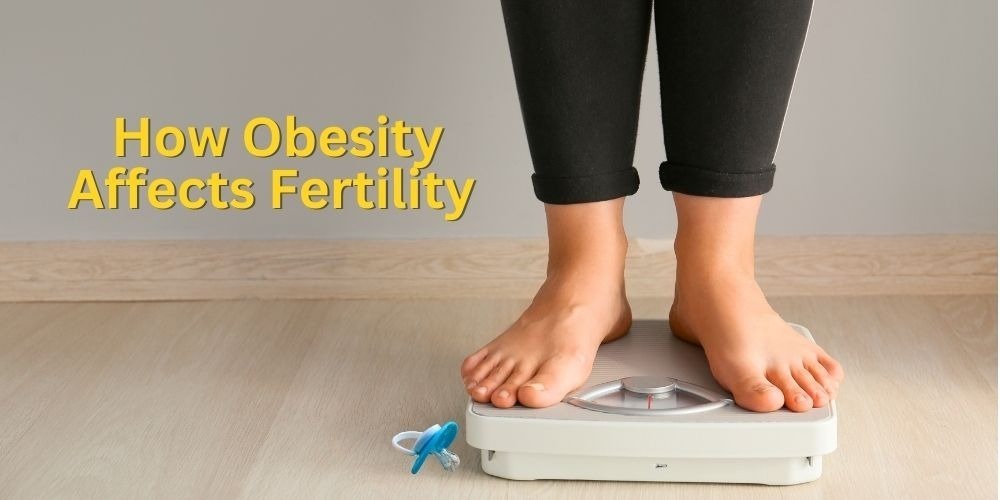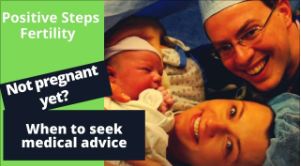Obesity and Fertility are two intertwined health topics that have garnered significant attention in recent years, with the effects of one often profoundly influencing the other. According to statistics from the Harvard T.H. Chan School of Public Health, two out of three Americans are overweight. One in three are classified as obese. With such prevalence in the sphere of public health, we must talk about how obesity can affect fertility.
Before we start, it’s important to note that we treat obesity like any other health issue at Positive Steps Fertility. We think body shaming is not only wrong but also harmful to patients. We focus on understanding each patient’s unique journey, meeting them where they are, and providing the best fertility care possible. With that in mind, let’s explore how obesity, from a medical perspective, can influence reproductive health.
#1. 10 ways obesity affects fertility
For some individuals, obesity can pose challenges to conceiving, particularly affecting women. The World Health Organization (WHO) defines obesity as a body mass index (BMI) of 30 or higher, a metric gauging body fat based on height and weight.
Some sources highlight the link between obesity and its effect on the fertility of over 20% of American women. However, pinpointing precise statistics is tricky, given the myriad causes of infertility. The Mayo Clinic suggests that, generally, a higher BMI correlates with an increased risk of infertility.
Obesity affects fertility by altering how the body stores and produces sex hormones like estrogen and progesterone. These hormones are essential for ovulation, which is the process of releasing an egg from the ovary each month. Obesity can also affect the quality and quantity of eggs and sperm, which are the building blocks of conception.
Some of the ways that obesity can interfere with fertility are:
- Hormonal Imbalance: Obesity can lead to an imbalance in hormones, particularly those involved in ovulation, which can lead to irregular menstrual cycles or anovulation (lack of ovulation).
- Polycystic Ovary Syndrome (PCOS): Obesity is commonly linked with PCOS, a condition characterized by hormonal imbalances and cysts in the ovaries, which can affect ovulation and fertility.
- Decreased Egg Quality: Research suggests that obesity might impact the quality of the eggs, which can affect the chances of conception.
- Increased Risk of Miscarriage: Some studies indicate that obesity might increase the risk of miscarriage.
- Impaired Assisted Reproductive Technologies (ART) Outcomes: Obesity can reduce the success rates of treatments such as in vitro fertilization (IVF).
- Male Factor Infertility: In men, obesity can lead to hormonal changes that reduce testosterone levels and sperm quality, affecting male fertility.
- Endometrial Lining Issues: Obesity can lead to a thicker endometrial lining, which might reduce the chances of embryo implantation.
- Increased Risk of Pregnancy Complications: Even after conception, obesity can increase the risk of complications such as gestational diabetes, preeclampsia, and stillbirth, which can indirectly influence one’s willingness or ability to conceive again.
- Reduced Libido: Obesity and related hormonal imbalances can lead to a decreased sex drive in both men and women, reducing the frequency of sexual activity and thereby the chances of conception.
- Insulin Resistance: Obesity is often associated with insulin resistance, which can affect fertility through hormonal imbalances.
An indirect effect obesity can have on fertility is that the journey of dealing with fertility challenges can be emotionally taxing. Obesity can add an extra layer of complexity, from societal stigmas to self-esteem issues. Organizations like Resolve provide support resources to help navigate the emotional terrain of the fertility journey.
#2. Obesity and Fertility: How does it affect treatments and pregnancy?
Obesity affects the ability to get pregnant and the health of the pregnancy and the baby. Some of the possible outcomes are:
- Reduced success rate of fertility treatments. Obesity may lower the chances of getting pregnant with certain fertility treatments, such as in vitro fertilization (IVF). This may be because of lower response to medications, lower implantation rates, or higher complications during procedures.
- Increased risk of pregnancy complications. Obesity can increase the risk of gestational diabetes, preeclampsia, preterm birth, cesarean delivery, infection, hemorrhage, and thromboembolism during pregnancy. These complications can affect the health of both the mother and the baby.
- Increased risk of birth defects. Obesity increases the risk of birth defects in babies. These defects include neural tube defects, heart defects, cleft lip and palate, and other anomalies and can defects can cause lifelong disabilities or even death.
- Increased risk of childhood obesity. Obesity can affect the metabolic programming of the baby in utero, which can influence their weight and health later in life. Children born to obese mothers may have a higher risk of obesity, diabetes, cardiovascular disease, and other chronic conditions.
#3. What can be done to improve fertility when diagnosed with obesity?
Studies have shown that losing as little as 5% to 10% of body weight can restore ovulation and menstrual cycles, improve hormonal balance, increase sperm quality and quantity, reduce pregnancy complications, and improve pregnancy outcomes.
Every person is different and has their own set of specific health factors to consider. It’s important to note again that there are several factors at work in determining fertility. Also, some studies have shown that women’s weight loss did not help fertility outcomes.
Still, weight loss has substantial health benefits that could directly or indirectly affect fertility. You can sometimes achieve weight loss by following a healthy diet and exercise regimen. Get advice from a doctor who knows your health. Talk to a medical professional to find out more. But some general tips are:
- Eat a balanced diet that includes fruits, vegetables, whole grains, lean protein, low-fat dairy products, healthy fats, and water. Avoid processed foods, added sugars, saturated fats, trans fats, salt, and alcohol.
- Exercise regularly for at least 150 minutes per week at moderate intensity or 75 minutes per week at vigorous intensity. Include aerobic activities that raise your heart and breathing rates, such as walking, jogging, cycling, swimming, or dancing.
- Monitor your progress by tracking your weight, BMI, waist circumference, and body fat percentage. You can also use apps, websites, or journals to record your food intake, physical activity, and mood. Seek professional help from a doctor, dietitian, or trainer if you need guidance or support.
If changing your lifestyle doesn’t help you reach a healthy weight or improve fertility, you should consider speaking to a specialist. The specialist can provide you with information about different choices that are available to you.
- Medications that can help regulate your hormones, ovulation, or blood sugar levels. For example, metformin is a drug that can improve insulin sensitivity and ovulation in women with PCOS. Clomiphene citrate is a drug that can stimulate ovulation in women with irregular or absent periods. Gonadotropins are hormones that can stimulate egg and sperm production in men and women with low levels of these hormones.
Surgery can help reduce your weight or treat certain conditions that affect fertility. For example, bariatric surgery is a procedure that can help in losing weight by reducing the size of your stomach or bypassing part of your intestine. Laparoscopic ovarian treatment involves a minimally invasive approach to help women with polycystic ovary syndrome (PCOS). By addressing the excessive tissue on the ovaries, this procedure aims to restore normal ovulation.
- Assisted reproductive technologies (ART) can help you conceive by bypassing some of the barriers caused by obesity. For example, IVF is a process where the ovaries are stimulated to make many eggs.
- The eggs are then taken and combined with sperm in a lab. Finally, one or more embryos are put into the uterus. Intrauterine insemination (IUI) is a procedure that involves placing washed sperm directly into the uterus around the time of ovulation.
#4. Assisted Reproductive Technologies (ART) and Obesity
Using assisted reproductive technologies (ART) is a viable option for many struggling with fertility. As previously noted, it can overcome complications caused by obesity. However, obesity can also impact the effectiveness of IVF techniques in certain circumstances.
Obesity and IVF in Women
IVF is a procedure that involves taking eggs from a woman. These eggs are then fertilized in a lab. Finally, they are put back into her womb.
Studies have shown that women with a BMI above the normal range have a higher risk of IVF cycle cancellation, lower embryo counts, lower implantation rates, and lower pregnancy rates. Obesity can also reduce the quality of eggs and increase the risk of miscarriage.
Obesity and IVF in Men
Obesity can also affect male fertility by reducing sperm quality and quantity. Men who are obese are more likely to have lower sperm counts.
This happens because obesity can elevate body temperature, especially around the scrotum, and lead to hormonal imbalances. This can also lead to higher estrogen levels and lower levels of sperm-producing hormones like inhibin b and androgen. This can affect sperm count, concentration, and motility.
How to Improve Your IVF Outcomes
Step one of improving your IVF outcomes, regardless of your health conditions, is consulting with a specialist. A fertility specialist can determine if IVF is right for you and guide you along the often confusing and winding road that is your fertility journey.
While obesity can pose challenges to fertility, solutions and pathways exist to overcome these obstacles. There is hope!
Losing weight and embracing a healthier lifestyle can enhance your prospects of conceiving and ensuring a healthy baby. But as we have covered, lifestyle factors aren’t the only considerations with obesity. It’s essential to consult your doctor about the best options for you.
If you believe obesity might be impacting your fertility, remember that you’re not alone in this journey. Many share your challenges, and you can overcome them. Contact us at Positive Steps to speak to our fertility specialists to tailor a path that suits your unique situation.
Don’t suffer in silence. Find answers, find peace.




